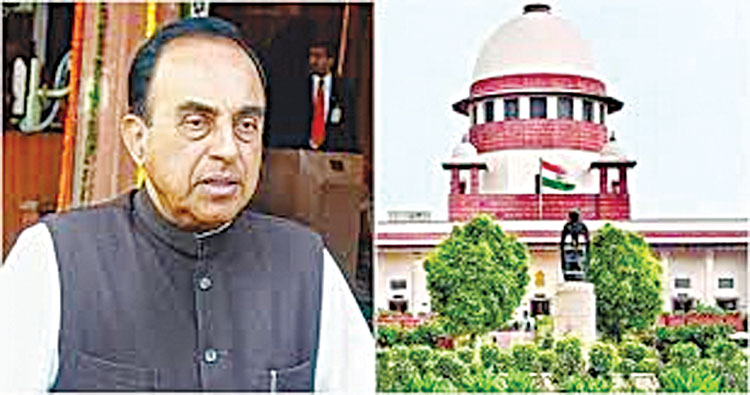New Delhi, Aug 13 (Bureau) The Supreme Court on Tuesday deferred the hearing on a plea filed by former Rajya Sabha MP Dr. Subramanian Swamy and advocate Ashwani Upadhyay seeking to delete the words “Socialist” & “Secular” from the Preamble of the Constitution as these were added during the Emergency. A bench headed by Justice Sanjiv Khanna after noting that advocate Ashwini Upadhyay had to leave as he had to attend an urgent case of medical emergency. Justice Khanna said that this matter has been pending for a long time and now that Dr Swamy has come in person the arguments must start. To this, Upadhyay asked the court for a short date as he had to leave urgently.
Justice Khanna re-listed the matter to the week commencing October 21. Upadhyay in his petition alleged that the insertion of the words “Socialist, Secular” into the Preamble in 1976 and that too retrospectively with effect from November 26,1949 was unconstitutional. These words, he said, were added during Emergency. The Constitution (Forty-fourth Amendment) Bill, 1976 which led to the enactment of Constitution (42nd Amendment) Act, 1976 was passed by the Lok Sabha on November 2, 1976, after the normal tenure of the Lok Sabha which expired on March 18, 1976.
Hence, the mandate of the people of India came to an end and there was no ‘Will of the People’ when these words were inserted. Upadhyay further said that Parliament was functioning only under the emergency provisions under the proviso to Article 83(2) of the Constitution and by virtue of the House of People (Extension of Duration) Act 1976, whereby the tenure of the Lok Sabha was extended to meet the emergency requirements and not to amend the basic structure of the Constitution. When Parliament debated the Constitution (Forty-fourth Amendment) Bill, 1976, the Proclamation of internal emergency imposed on June 25, 1975 was in operation and most of the Opposition members of both the Houses of Parliament were in jail due to preventive detention and there was no debate, the petition said. There was widespread fear and threat amongst the citizens, the Press was gagged, Opposition members of Parliament were jailed and democracy was totally throttled. In such circumstances, Parliament had no authority to amend the Constitution, much less the Preamble and/or Fundamental Rights, Upadhyay said.

